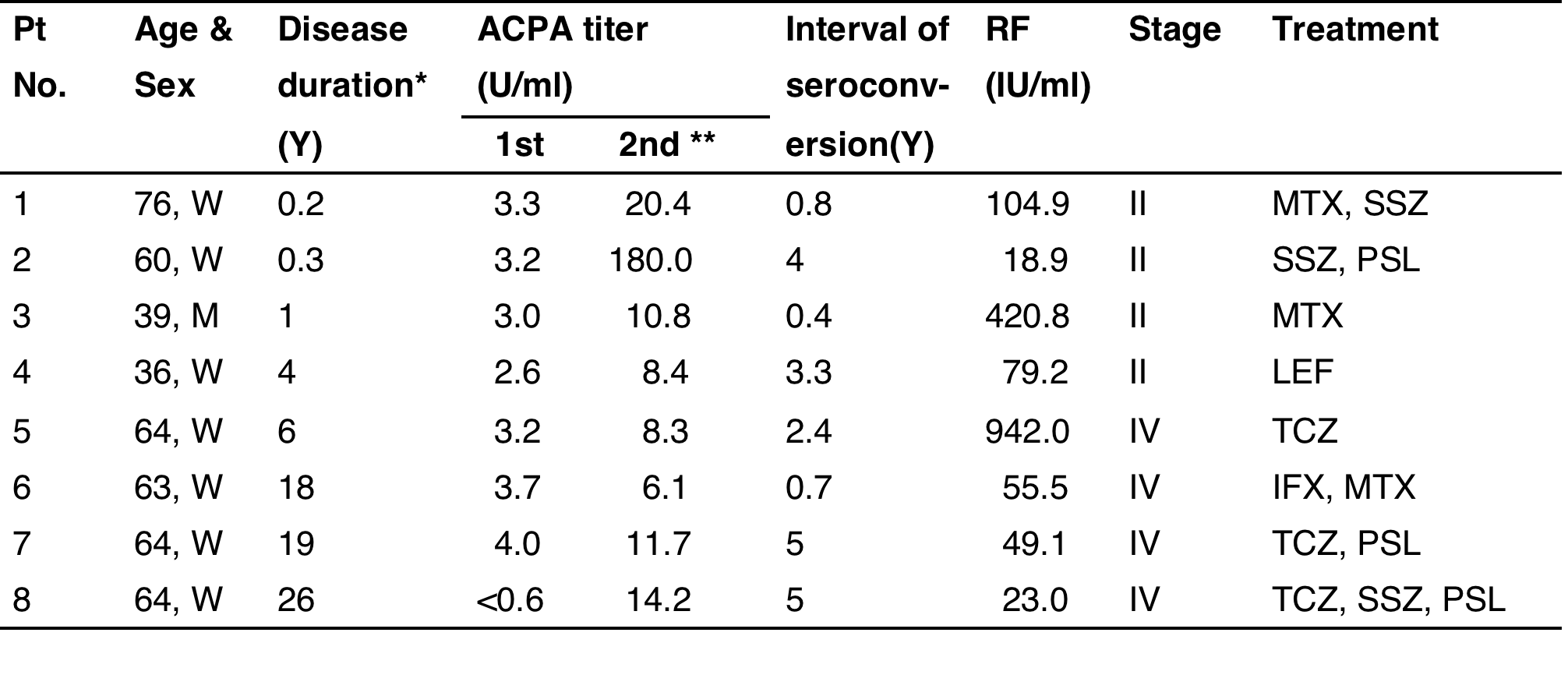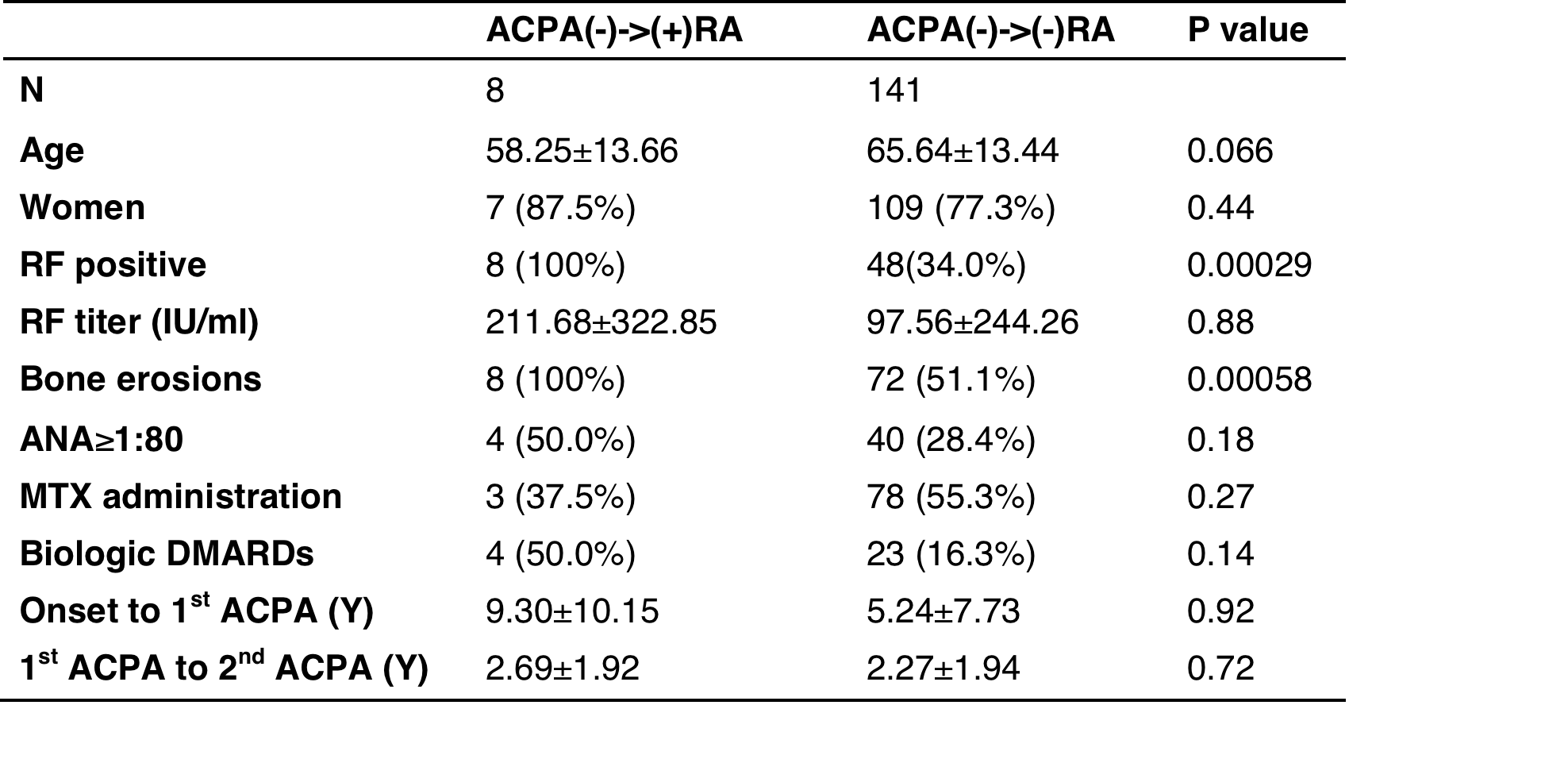Session Information
Session Type: Abstract Submissions (ACR)
Background/Purpose: Sensitivity of anti-citrullinated peptide/protein antibody (ACPA) in early rheumatoid arthritis (RA) has been reported to be as low as 50%, whereas that in established RA is ~80%. The discrepancy of these figures has been explained by the seroconversion from ACPA-negative RA to ACPA-positive RA, but the seroconversion of ACPA seems to be rare in the previous reports. We investigated the precise proportion of seroconversion of ACPA retrospectively.
Methods: RA patients were recruited from January 2007 through November 2011 at Kyoto University Hospital and all the patients were Japanese. Titer of ACPA in sera or plasma was measured with the 2nd generation anti-CCP antibody ELISA kit. The ACPA-negative RA patients who were measured ACPA more than once with the interval of 3 months or longer were investigated for seroconversion of ACPA. The clinical characteristics of patients who turned into ACPA-positive were also assessed. Student’s t-test and Fisher’s exact probability test were used in statistical analysis.
Results: 216 (17.3%) out of 1,246 RA patients were negative for ACPA. In 149 cases of the ACPA-negative RA whose ACPA were measured more than once, only 8 patients (5.4%) turned into ACPA-positive during follow up. When we investigated the clinical characteristics of the 8 seroconverted cases (Table 1), we found all of them were positive for rheumatoid factor (RF) and showed bone erosions by X-ray. None of the ACPA-negative RF-negative RA turned into ACPA-positive. Since there were 56 ACPA-negative RF-positive RA, 14.3% of them seroconverted to ACPA-positive. The comparison of the basic clinical information of seroconverted and non-seroconverted RA patients were shown in Table 2.
Table 1. Clinical characteristics of each patient who turned into ACPA-positive
MTX; methotrexate, SSZ; sulfasalazine, PSL; prednisolone, LEF; leflunomide, TCZ; tocilizumab, IFX; infliximab
*Duration from disease onset to the first ACPA measured
**ACPA titer when ACPA was seroconverted.
Table 2. Basic cinical information of seroconverted RA and non-seroconverted RA
Conclusion: The proportion of seroconversion from ACPA-negative to ACPA-positive RA was as total 5.4%. This result is consistent with the previous report in an early arthritis cohort in Europe, in which only 0.8% was seroconverted from ACPA-negative to ACPA-positive. When we subdivided ACPA-negative RA into RF-negative and RF-positive, only RF-positive subset seroconverted to ACPA-positive. These results imply that ACPA-negative RF-negative RA and ACPA-negative RF-positive RA may be different subsets.
Disclosure:
R. Hiwa,
None;
K. Ohmura,
None;
S. Nakabo,
None;
C. Terao,
None;
R. Nakashima,
None;
Y. Imura,
None;
N. Yukawa,
None;
H. Yoshifuji,
None;
M. Hashimoto,
None;
M. Furu,
None;
H. Ito,
None;
T. Fujii,
None;
T. Mimori,
None.
« Back to 2013 ACR/ARHP Annual Meeting
ACR Meeting Abstracts - https://acrabstracts.org/abstract/only-rheumatoid-factor-positive-subset-of-anti-citrullinated-peptideprotein-antibody-negative-rheumatoid-arthritis-seroconverts-to-anti-citrullinated-peptideprotein-antibody-positive/


